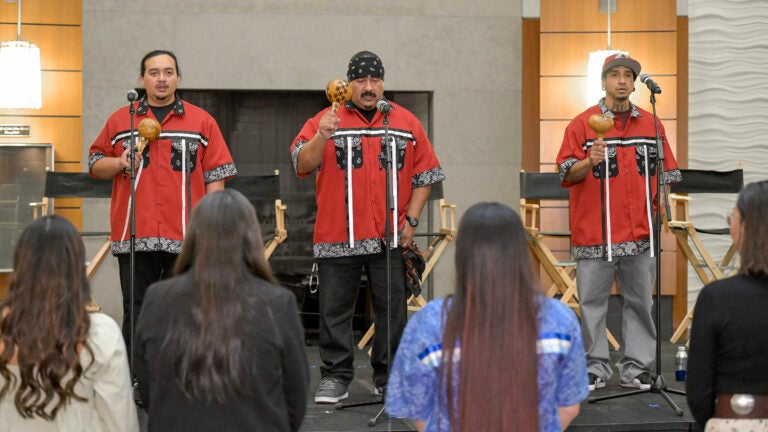
Bird singers from the Torres Martinez Desert Cahuilla Indians perform at USC’s first Native American Heritage Month celebration on Wednesday. (USC Photo/Gus Ruelas)
Indigenous Trojans open up about their history, culture and the challenges they face
More than 175 people attend USC’s celebration of Native American Heritage Month.
During the university’s first campuswide celebration of Native American Heritage Month on Wednesday, Assistant Professor Chris Finley of the USC Dornsife College of Letters, Arts and Sciences looked into the audience and made an observation: “This is my eighth year here, and this is the most Indigenous people I’ve ever been with on campus — ever.
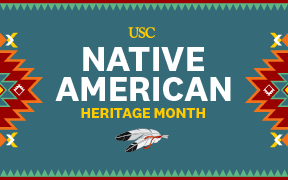
“I’m really excited to be here and glad to be with you all to celebrate this moment,” said Finley, who is a member of the Colville Confederated Tribes. The assistant professor of American studies and ethnicity teaches a Native American studies course and developed the Native American studies minor in her department.
The Native American Student Assembly hosted the event inside the Ronald Tutor Campus Center’s Trojan Family Room — which became so crowded that some of the more than 175 attendees watched the program from the steps of a nearby staircase.
The celebration recognized the cultures, spiritualities and lands of Native Americans and included performances of a traditional form of Cahuilla music known as bird songs. The songs — in addition to their accompanying dances — serve as an oral tradition to keep the history and spirit of both the family and the tribe alive.
“These songs are the songs of our people, everything from our creation story to our migrations to where we’re at today — and they’re social songs,” said Derek Duro, head singer of Torres Martinez Bird Singers.
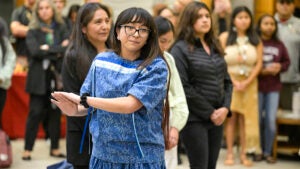
The event also included heartfelt remarks by students, faculty members and staff; a welcome from USC President Carol Folt; a panel discussion on the importance of Native American Heritage Month; and a presentation from the women’s lacrosse team on the origins of lacrosse as a Native American sport.
Deeply personal land acknowledgment
The event’s land acknowledgment — a formal statement that a public event is taking place on land originally inhabited by Indigenous peoples — felt deeply personal when it was presented by USC Dornsife first-year student Dineh Barragan.
Barragan, who is majoring in environmental studies, shared that her Gabrielino community ancestors are the original caretakers and stewards of the land where USC’s University Park Campus is located. She is the first in her family to achieve higher education and currently the first and only member of her tribal nation at USC.
“This shared space is where we live, study, work and raise families among the Gabrielino community,” Barragan said. “However, the land also symbolizes the trauma and removal of my people. We must recognize, respect and fully support current efforts by all Gabrielino peoples to encourage revitalizing [and] practicing their traditions and culture.”
A growing Indigenous presence
During her remarks, Folt described the event as “an amazing, beautiful gathering” that she predicted will continue to strengthen and grow in future years. She shared that of the university’s student population of approximately 47,000 students, 515 undergraduates and 375 graduate students identify as Indigenous Native American & Pasifika (peoples of the Pacific Islands).
“The numbers are increasing, and we’re excited about that,” she said.
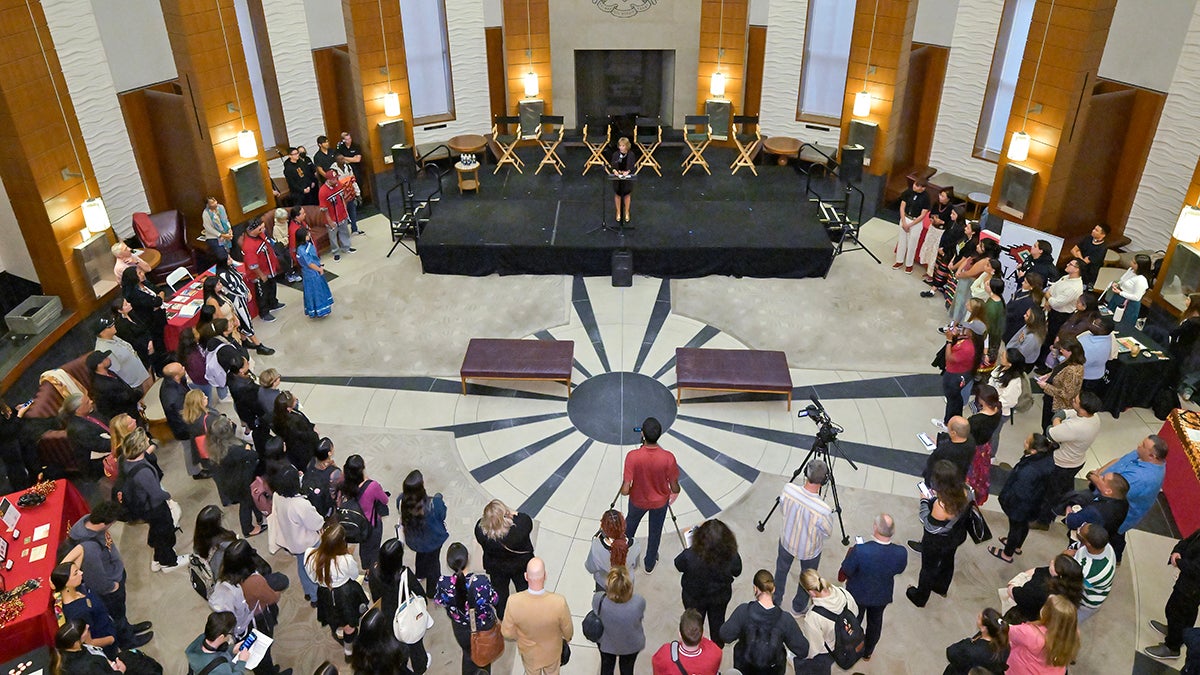
Folt also talked about the 2022 renaming of one of USC’s most iconic academic buildings after Joseph Medicine Crow — a member of the Crow Nation, World War II hero, historian and alumnus who also received an honorary doctorate in 2004 from USC.
Folt recalled that one of the most memorable speakers at the dedication of the renamed building was the assembly’s student co-founder, Maracea “Mesa” Chase, who is part of the Navajo community with Hopi and Lakota heritage. Folt closed her remarks by repeating some of what Chase had said on that day: “When there is recognition and representation, there’s understanding.”
Student leaders find each other and organize
The student assembly for Native American Trojans is now one of nine cultural assemblies under USC’s undergraduate Student Government Programming Branch. It currently has 30 members and serves and connects Indigenous-identifying students on campus.
As the only Native American programming entity on campus, the group aims to voice the concerns and needs of the Native American student body at USC and provide members and allies with the opportunity to connect and empower one another through academic, pre-professional, cultural and social events.
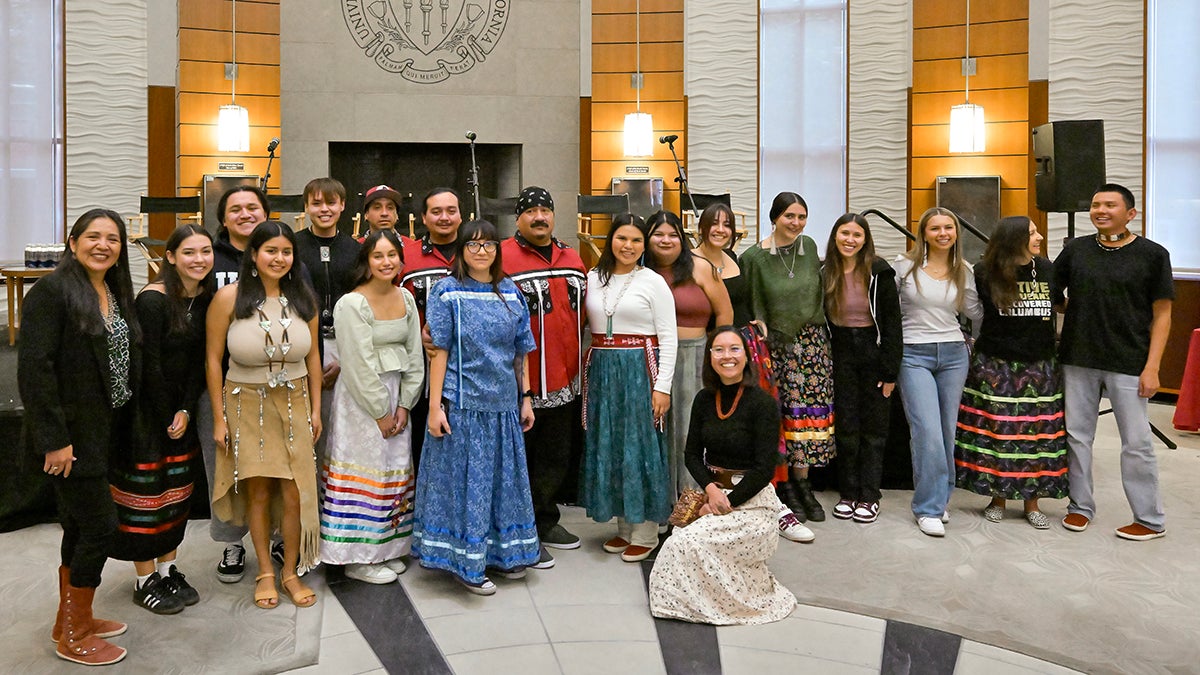
Co-executive directors Daniel Williams and Nizhoni McDonough told the crowd that the group is proud to be united by its passion for advocacy, community care and Land Back, which is a campaign by Native Americans in the United States seeking to reestablish Indigenous sovereignty with political and economic control of their ancestral lands.
“We are proud to be a home for Native students from all across Turtle Island [the name for North America used by some Indigenous people] representing over a dozen unique tribal affiliations,” said McDonough, a member of the Navajo Nation and a USC Dornsife student majoring in law, history and culture. “Remember, this campus has always been and will always be native land. Your ancestors are proud of you. We hope today serves as a reminder that you deserve to be celebrated.”
Dylan Goodwill, a member of the Navajo Nation and Lakota and Dakota tribes, is staff advisor to the assembly and served as the event’s emcee and moderator.
“The Native Trojan Family is very strong, and we look out for each other,” said Goodwill, senior assistant director of undergraduate admission at USC with a focus on Native American recruitment. “I just am so appreciative of the community it’s built … because Native students have a right to be here and belong here as well.”
Goodwill said Indigenous history, because of colonization, can be “difficult” and “depressing” to learn about, “but it needs to be taught because there’s so many layers to our identity.”
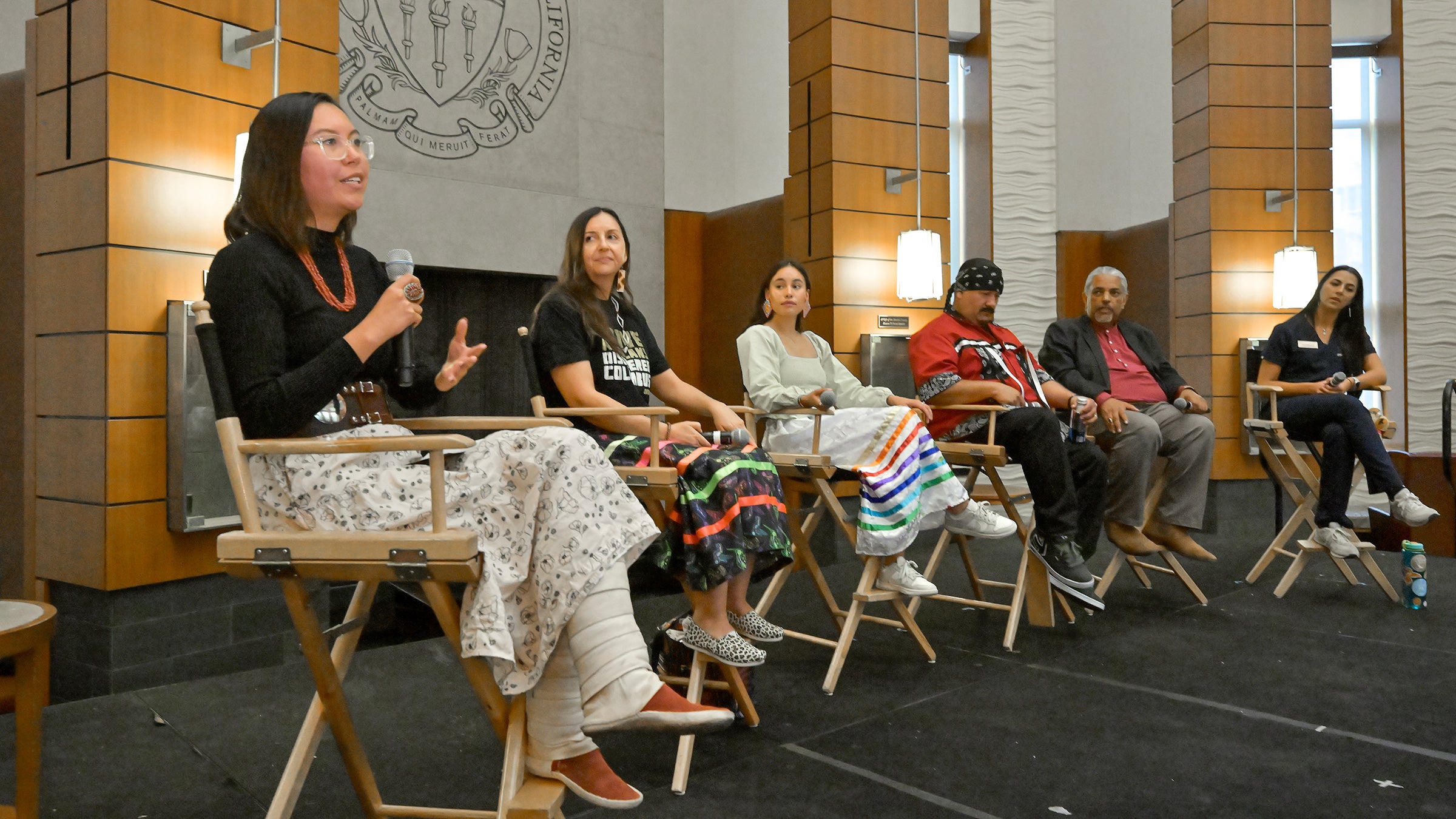
One student’s story: From reservation to USC
USC Dornsife junior Amia Roach-Valandra, a member of the Native American Student Assembly’s executive board, participated in the panel discussion and shared that she is from the Rosebud Indian Reservation in South Dakota. She described the event as “a surreal moment” and was proud to be representing her fellow students and to be a Trojan.
Roach-Valandra will be returning to her reservation for the holidays and shared that she is always trying to find balance “between this [USC] world and mine.” But the progress of the student assembly has given her a sense of pride and of mission.
“To have this event and everyone here is so amazing,” she said. “I’m so proud of us.”



